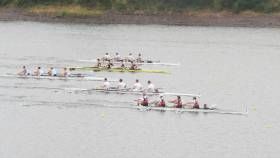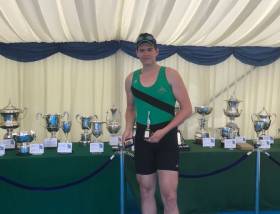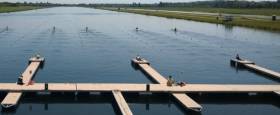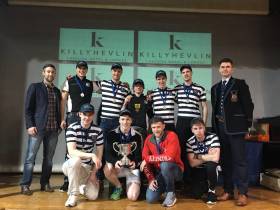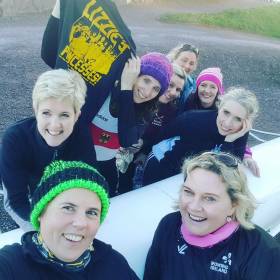Displaying items by tag: UCC
#Rowing: Seven different clubs won in the second session of finals on the second day of the Irish Championships. The races were run in hot sunshine.
Two women's finals senior finals were won in emphatic fashion. Georgia O'Brien of Kenmare won in the women's senior single sculls to give the club its second Championship. NUIG were also well in control in their victory in the women's senior pair.
Sadhbh Scully of Carlow, who is a junior, followed the trend in her big win in the women's club single sculls.
The women's junior 18 eights was a tighter affair, though Bann, once in the lead, held on strongly to rebuff Enniskillen.
The men's junior quadruple was a big event, with Lee taking the title ahead of Three Castles and Neptune.
Cork clubs are having a good Championships, and UCC took the women's club eights.
Skibbereen figured strongly in some finals, but had their first Championship win when Kealan Mannix won the intermediate single sculls from Shane Haugh of Castleconnell.
#Rowing: The battle of the doubles went the way of the heavyweights at Skibbereen Regatta today. Philip Doyle and Ronan Byrne powered away from Skibbereen lightweights Fintan and Jake McCarthy into the headwind to win.
On a beautiful day, there were clearcut wins in the fours races. UCC's women's crew of Margaret Cremen, Selma Bouanane, Tara Hanlon and stroke woman Emily Hegarty were in control. UCD's men - Shane O'Connell, Andrew Goff, Shane Mulvaney and David O'Malley - were also on top.
The men's Division Two coxed four final had an exciting finish: UCC's club two crew crossed just ahead of Colaiste Iognaid's junior crew.
#Rowing: Commercial won a stunningly-close race to take the men’s senior eights title at the Irish Rowing Championships today. NUIG/Queen’s had a slight lead ahead of a tightly-packed field early on, but Commercial moved at the 1,000 metres. They could not shake off UCD and the NUIG/Queen’s composite. UCD
finished really fast and almost – but not quite – caught Commercial, who were taking their third consecutive title.
The women’s senior eight went to Skibbereen. Their talented crew, stroked by Denise Walsh, had a clearwater lead over NUIG, who did not give up the fight but finished second. Skibbereen lifted their title haul to eight with the win.
Enniskillen started the evening session with two wins, in the women’s club eight, where Shandon pushed them, and the men’s junior pair, who were imperious in their victory.
The women’s junior coxed quadruple from Workmen’s was similarly impressive – the quality of junior rowing was a remarkable aspect of this regatta.
Another notable aspect was the proportion of wins which went to Cork clubs. Two of the last three titles did not leave the rebel county: UCC finished out their successful programme with a win in the men’s intermediate double through Ronan Byrne and Hugh Sutton, while Selma Bouanane took the last race of the event, the women’s intermediate single, for Fermoy.
Irish Rowing Championships, Day Three (Selected Results)
Men
Eight – Senior: 1 Commercial (S Mac Eoin, C Cunningham, L Cameron, N Beggan, P Moreau, F Groome, M Corcoran, C Dowling; cox: M Crockett) 5:43.18, 2 UCD 5:43.76, 3 NUIG/Queen’s 5:46.82.
Four – Club, coxed: UCC A 6:38.03.
Pair – Inter: Shandon A 6:56.07. Junior: Enniskillen 6:56.199.
Sculling, Double – Inter: UCC 6:32.59. Junior: Castleconnell (R O’Neill, J Desmond) 6:49.97.
Lightweight Single: Skibbereen (A Burns) 7:20.56.
Women
Eight – Senior: 1 Skibbereen (L Heaphy, O Hayes, M Piggott, A McCarthy, N Long, N Casey, A Casey, D Walsh; cox: A O’Neill) 6:28.42, 2 NUIG A 6:33.32, 3 Trinity 6:48.35. Club: Enniskillen 6:48.33.
Four – Inter, coxed: Cork 7:22.36.
Pair – Junior: Fermoy (E O’Reilly, G McGirr) 7:48.69.
Sculling, Quadruple – Junior: Workmen’s 7:01.06.
Single – Inter: Fermoy (S Bouanane) 8:03.25.
Lightweight Single: 1 Lee (M Cremen) 8:06.97
Cork Clubs Come to Fore at Irish Rowing Championships
#Rowing: UCC brought their title tally to three as they added the club coxed four to their club eights and intermediate single sculls pots at the Irish Rowing Championships today. The four was tested by four other crews coming to the line but broke free and won. The morning session on the Sunday was held in intermittent light rain.
Margaret Cremen won the women’s lightweight single sculls. The Lee woman looked dominant through much of the race, but as she approached the line she was hunted down by Orla Hayes of Skibbereen, who closed to just a few seconds on the line. Hayes’s clubmate, Aodhan Burns, left no doubts as to his intentions in the men’s lightweight single. He left the rest behind and won well.
The men’s intermediate pair gave Shandon a chance to demonstrate the depth of their talent pool. Stephen O’Sullivan and Colm Hennessy teamed up to win. The Castleconnell junior double of James Desmond and Rory O’Neill came under pressure from Lee in their win.
One of the closest races in the Championships so far came in the women’s intermediate four. Leaders Trinity were pipped on the line by Cork, whose winning margin was under a third of a second (.312).
Killorglin’s Anna Tyther and Rhiannon O’Donoghue gave Fermoy a test in the women’s junior pair. Gill McGirr and Eliza O’Reilly are an excellent crew, however, and held off their Kerry rivals.
Irish Rowing Championships, Day Three (Selected Results)
Men
Four – Club, coxed: UCC A 6:38.03.
Pair – Inter: Shandon A 6:56.07.
Sculling, Double – Junior: Castleconnell (R O’Neill, J Desmond) 6:49.97.
Lightweight Single: Skibbereen (A Burns) 7:20.56.
Women
Four – Inter, coxed: Cork 7:22.36.
Pair – Junior: Fermoy (E O’Reilly, G McGirr) 7:48.69.
Sculling, Lightweight Single: 1 Lee (M Cremen) 8:06.97.
Championship Records Tumble at National Rowing Centre
#Rowing: Records fell in race after race in the final Saturday session of the Irish Championships. The Skibbereen senior quadruple of Fintan McCarthy, Aodhan Burns, Kealan Mannix and Jake McCarthy smashed the Championship best of 5:59.10 as they won in 5:50.696.
The Shandon junior quadruple of Eoin Gaffney, Luke Hayes-Nally, Jack Dorney and Alex Byrne – all set to compete at the World Junior Championships – set a new time of 5:58.26. This beat the old Championship record of 6:07.97.
In both cases the crews were bettering times set by their own club.
Lisa Dilleen’s win in the women’s senior single scull was emphatic. The Cork Boat Club sculler set a Championship course record of 7:34.282, bettering Monika Dukarska’s time of 7:35.07.
Ronan Byrne of UCC took the intermediate single, under some pressure from Niall Beggan of Commercial. Byrne’s time of 6:55.898 bettered Kealan Mannix’s time of 7:03.51, set last year.
Enniskillen took the women’s junior eights, in 6:30.753, bettering their own time from last year of 6:36.24.
In the women’s senior pair, Aine McCarthy and Niamh Casey shattered the old Championship record of 7:23.78, setting a new time of 7:17.176.
Joan Poh of Neptune also won the club single sculls in a new record. The old figure was 8:09.22. Poh won in 8:06.13.
UCD continued their fine run in eights by adding the men’s novice title to the intermediate one.
Irish Championships, Day Two (Selected Results)
Men
Eight – Inter: UCD 5:43.70. Novice: UCD 6:03.599.
Four – Junior, coxed: Enniskillen 6:22.66.
Sculling, Quadruple – Senior: Skibbereen 5:50.696. Jun: 1 Shandon 5:58.26
Single – Inter: UCC (R Byrne) 6:55.898. Club: Carlow (F O’Driscoll) 7:25.3.
Women
Eight – Novice: Queen’s 7:04.49. Jun: Enniskillen 6:30.75.
Pair – Senior: Skibbereen 7:17.18.
Sculling, Double – Inter: Skibbereen 7:09.09. Single – Senior: Cork BC (L Dilleen) 7:34.28. Club: Neptune (J Poh) 8:06.1. Jun: Coleraine GS (M Curry) 7:53.46.
Irish Crews Amongst the Trophies Again at London Met
#Rowing: Philp Doyle of Queen’s and Ronan Byrne of UCC won the Championship Double and Sam McKeown of Queen’s the Championship Single on the second day of London Metropolitan Regatta at Dorney Lake today. Doyle and Byrne form part of the Ireland training group at the National Rowing Centre. Tristan Orlic of Neptune also took the junior 18 singles at Dorney. Commercial competed in the Challenge Eight and won a trophy.
London Metropolitan Regatta, Dorney Lake (Irish interest; selected results, winners unless stated)
Saturday
Men
Eight – Championship: 1 Leander 5:49.90, 2 Commercial 5:52.74.
Four – Championship: 3 Commercial 6:12.20. Tier Two: Shandon.
Four, coxed – Tier Three: Tribesmen 6:32.26. Academic, Tier Two: NUIG.
Pair – Tier Two: UCC 7:14.93.
Double Sculls – Championship: 2 UCC (R Byrne, H Sutton) 6:32.50. Tier Two: Castleconnell 6:42.50.
Single Sculls – Championship: 2 UCC (R Byrne) 7:03.99. Tier Two: Univ of Limerick (K Mannix) 7:18.36. Tier Three: St Michael’s (D O’Connor).
Women
Eight – Club, Tier Two: NUIG/Tribesmen 6:50.64. Academic, Tier Two: Trinity 6:57.77.
Four – Academic, Tier Two: Trinity 7:08.62.
Four, coxed – Championship: NUIG/Tribesmen 7:20.88. Tier Four: Univ of Limerick.
Pair – Championship: 2 Commercial (H O’Neill, R Morris) 7:46.57. Tier Two: NUIG 7:39.84.
Double Sculls – Championship: 3 London/Skibbereen (M Jackson, N Long) 7:28.48.
Sunday
Men
Four – Tier Four: UCC 6:47.80. Four, coxed – Tier Two: UCC 6:55.08.
Double – Championship: UCC/Queen’s (R Byrne, P Doyle) 6:28.43. Tier Two: UCC/Queen’s (Byrne, Doyle) 6:37.50.
Single – Championship: Queen’s (S McKeown) 7:11.67. Tier Three: Castleconnell (S Haugh) 7:29.95. Jun 18: Neptune (T Orlic) 7:53.76.
Women
Four, coxed – Tier Two: NUIG/Tribesmen 7:45.07. Tier Three: Univ of Limerick 7:49.44.
Pair – Tier Two: Cork 7:22.18.
#Rowing: Commercial finished second to Leander in the men’s Championship Eights at London Metropolitan Regattta at Dorney Lake today. It was one of a string of good results for Irish clubs. NUIG and Tribesmen shone and teamed up to win the women’s Championship coxed four. UCC – who took second in the Championship single sculls through Ronan Byrne – also excelled. Trinity, the University of Limerick, Shandon and Castleconnell also had wins.
London Metropolitan Regatta, Dorney Lake (Irish interest; selected results, winners unless stated)
Men
Eight – Championship: 1 Leander 5:49.90, 2 Commercial 5:52.74.
Four – Championship: 3 Commercial 6:12.20. Tier Two: Shandon.
Four, coxed – Tier Three: Tribesmen 6:32.26. Academic, Tier Two: NUIG.
Pair – Tier Two: UCC 7:14.93.
Double Sculls – Championship: 2 UCC (R Byrne, H Sutton) 6:32.50. Tier Two: Castleconnell 6:42.50.
Single Sculls – Championship: 2 UCC (R Byrne) 7:03.99. Tier Two: Univ of Limerick (K Mannix) 7:18.36. Tier Three: St Michael’s (D O’Connor).
Women
Eight – Club, Tier Two: NUIG/Tribesmen 6:50.64. Academic, Tier Two: Trinity 6:57.77.
Four – Academic, Tier Two: Trinity 7:08.62.
Four, coxed – Championship: NUIG/Tribesmen 7:20.88. Tier Four: Univ of Limerick.
Pair – Championship: 2 Commercial (H O’Neill, R Morris) 7:46.57. Tier Two: NUIG 7:39.84.
Double Sculls – Championship: 3 London/Skibbereen (M Jackson, N Long) 7:28.48.
Trinity Keep Up Record of Wins at Erne Head
#Rowing: Trinity’s senior eight were the fastest crew at the re-fixed Erne Head of the River in Enniskillen today. It was their fourth consecutive win, achieved this year in rainy conditions. Junior crews did well: Enniskillen RBC’s junior men’s eight were third fastest overall and the fastest women’s crew was the host club’s junior eight.
In Amsterdam, UCC’s men’s eight were the best Irish crew at the Heineken Roeivierkamp. They took 32nd in the men’s race over 2,500 metres in seven minutes 36.8 seconds.
Erne Head of the River, Saturday (Selected Results)
Overall: 1 Trinity men’s senior eight 19 minutes 17 seconds, 2 Commercial sen eight 19:50, 3 Enniskillen jun eight 20:04, 4 Trinity inter eight 20:27, 5 Neptune club two eight 20:49, 6 Lagan senior quadruple 20:57: 17 Enniskillen women’s junior eight 22:39.
Men
Eight – Senior: Trinity 19:17. Inter: Trinity 20:27. Club Two: Neptune 20:49. Nov: Trinity A 21:26. Junior: Enniskillen 20:04. Masters: Commercial (D) 21:42. Jun 16: Col Iognaid 22:20.
Four – Jun, coxed: Commercial 22:35.
Sculling, Quadruple – Sen: Lagan Scullers 20:57. Inter: Belfast 21:53. Nov, coxed: Commercial 27:13. Jun: Neptune A 21:12. Jun 16, coxed: Bann 23:17. Masters, coxed: City of Derry (E) 24:31.
Women
Eight – Inter: Trinity 22:48. Club One: Bann 22:46. Club Two: Carlow 25:59. Jun: Enniskillen 22:39. Jun 16: Enniskillen A 23:53. Masters: Portora (D) 30:27.
Four – Sen: Trinity 24:25. Inter, coxed: Trinity 26:35.
Sculling, Quadruple – Jun: Col Iognaid 25:22. Jun 16, coxed: Carlow 25:08. Masters, coxed: City of Derry, Lagan, Offaly (C) 29:42.
Roeivierkamp, Amsterdam (Selected Result)
Men, 2500 metres: 1 Nereus 1e Eight 6:48.6; 8 Nereus 2e Eight 7:10.8; 32:UCC 2e Eight 7:36.8.
MaREI Centre Recruiting Senior Post-Doc Researcher
#MarineScience - Applications are invited for the post of Senior Post-Doctoral Researcher to join the MaREI Centre for Marine and Renewable Energy in University College Cork (UCC), based at the Beaufort Building in Ringaskiddy.
MaREI is a key research centre within UCC’s Environmental Research Institute (ERI) which is an internationally recognised Institute for environmental research dedicated to the understanding and protection of our natural environment and to developing innovative technologies, tools and services to facilitate a transformation to a zero-carbon and resource-efficient society.
Researchers in the MaREI Centre have over 30 years of experience in conducting fundamental and applied research supported by competitively won national and international funding, and commercial contracts with government agencies and industry.
MaREI’s strengths lie in the multi-disciplinary nature of its research teams, allowing it to combine insights across areas such as MRE Technologies, Materials & Structures, Observation & Operations, Coastal & Marine Systems, Bioenergy, Energy Policy & Modelling, and Renewable Energy Management.
The candidate will lead research focussed on but not limited to Horizon 2020 project the Coastal Waters Research Synergy Framework, or Co-ReSyf, which is currently developing a dedicated data access and online processing platform, with automated tools, methods and standards to support research application and data synergies using Earth observation (EO) data for the monitoring of coastal waters.
The main objective is better enable the research community to access a variety of dedicated data and pre-processing tools and, thus facilitate the provision of EO based, coastal waters services.
The Co-ReSyf platform is developed based on extensive user requirement gathering and stakeholder engagement, to which the candidate will contribute, as required.
UCC is a member of the Co-ReSyf consortium, and the project is one of a number of initiatives currently underway within the MaREI EO group. As a result, the successful candidate is expected to contribute to a number of current projects.
The deadline for applications is this Friday 16 February. More details are available from the UCC website HERE.
Cork and Shandon In Form at Muckross Head
#Rowing: Cork Boat Club’s intermediate eight proved the fastest crew at the Muckross Head of the River at the National Rowing Centre. Shandon, who had a set of good results, saw their eight finish just five seconds off that pace – and their junior 18 quadruple took just nine minutes and 48 seconds to cover the course, placing them seventh overall. Justin Ryan of Skibbereen was the fastest single sculler.
The adult women’s ranks were thinner in numbers. Monika Dukarska was the fastest single sculler. A masters women’s crew from Lady Elizabeth and Dublin University Ladies Boat Club won: it featured well-known names, including former internationals Vanessa Lawrenson and Heather Boyle.
Muckross Head of the River – Selected Results
Overall: 1 Cork BC intermediate eight 9 mins 20 sec, 2 Shandon inter eight 9:25, 3 UCC senior quadruple 9:35.
Men, Eight – Intermediate: Cork 9:20. Club One: UCC 9:35. Club Two: UCC 9:44. Jun 16: Fermoy 10:35. Masters: Castleconnell 13:25.
Four – Sen: Shandon 9:56. Inter, coxed: Skibbereen 10:36. Club One: UCC 10:33. Jun 18, coxed: Presentation Col (D Murphy) 11:07
Pair – Sen: Skibbereen 10:54. Jun 18: Shandon 10:55.
Sculling, Quadruple – Sen: UCC 9:35. Club One, coxed: UCC 13:05. Club Two, coxed: Workmen’s 11:05. Masters, coxed: Clonmel 13:26. Jun 18: Shandon 9:48. Jun 16, coxed: Lee 10:56.
Double – Sen: UCC 11:33. Inter: UCC 10:37. Club One: Shandon 11:09. Jun 18: Skibbereen 11:11. Jun 16: Shandon 11:28.
Single – Sen: Skibbereen (J Ryan) 11:26. Inter: Castleconnell (P Silke) 12:00. Club One: Castleconnell 12:15. Club Two: Cork (R Povey) 12:16. Jun 18: Shandon (E Gaffney) 11:39. Jun 16: Tralee (B Winde) 12:57. Masters (H, adjusted): Lee Valley 13:40 (11:36).
Women,
Eight – Club One: Lee Valley 13:08. Club Two: Shandon 11:12. Jun 16: Muckross 12:28. Masters: Lady Elizabeth, Trinity 12:35.
Four – Sen: Skibbereen 11:36. Inter, coxed: Skibbereen 12:53. Club Two, coxed: Cork 12:22.
Pair – Sen: UCC/Skib 11:58.
Sculling, Quadruple - Sen: Workmen’s 10:50. Club One, coxed: Fermoy 12:14. Club Two, coxed: Lee 12:35. Jun 18: Workmen’s 11:12. Jun 16, coxed: Lee 12:29.
Double – Sen: Cork 11:41. Club One: Workmen’s 12:00. Jun 18: Workmen’s 11:49. Jun 16: Killorglin 12:19.
Single – Sen: Killorglin (M Dukarska) 11:54. Inter: Skibbereen (L Heaphy) 13:09. Club One: Lee Valley 13:08. Club Two: Killorglin (E O’Donovan) 13:35. Jun 18: Kenmare (E Crowley) 13:19. Jun 16: Killorglin (R O’Donoghue) 13:19. Masters: Clonmel (F, adjusted) 14:54 (13:26)



























